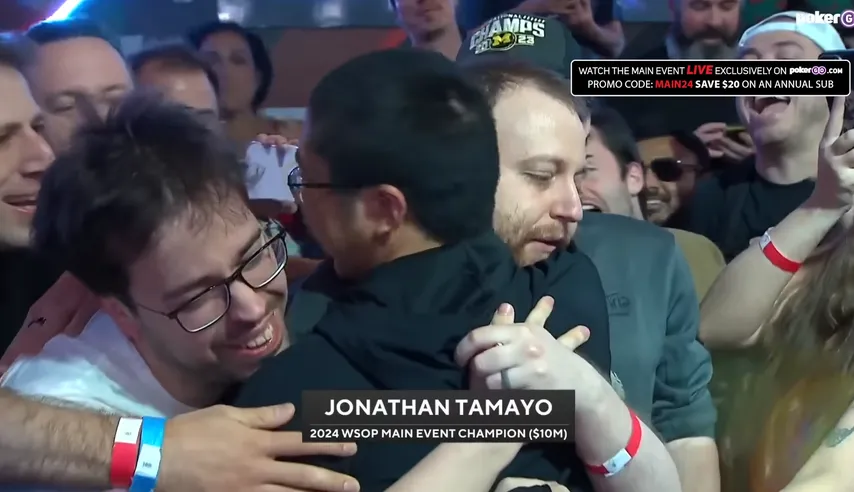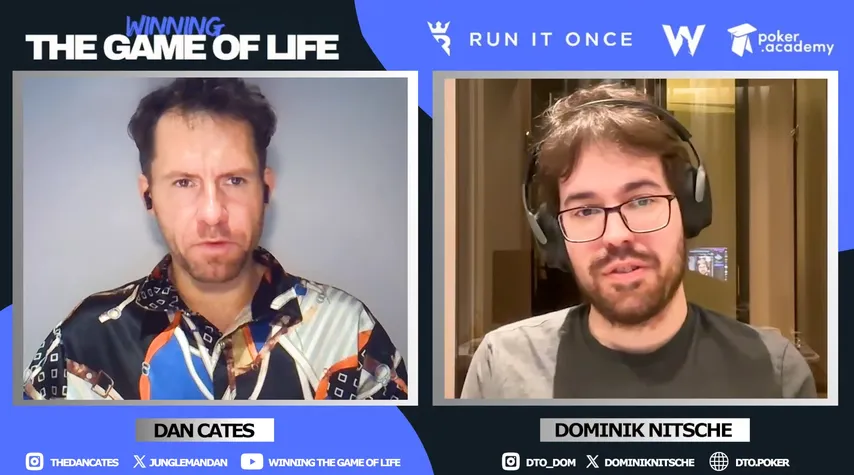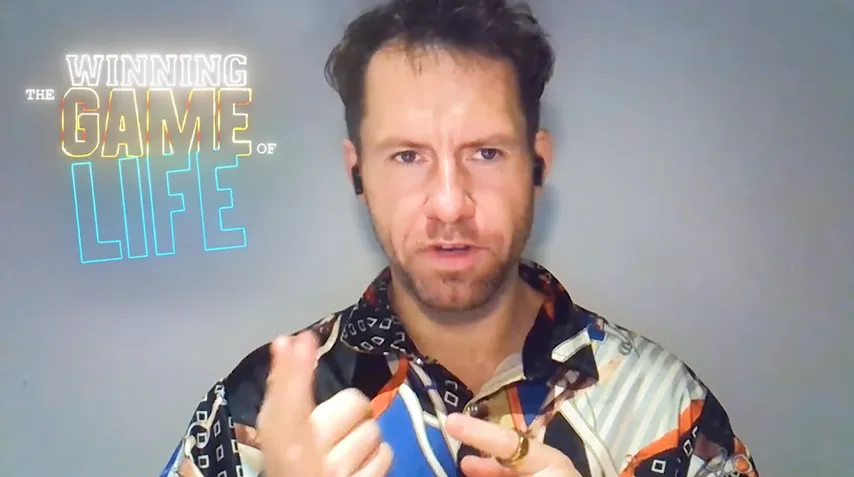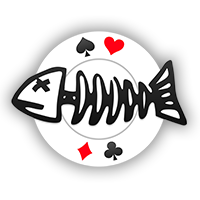Daniel Cates – So I want to ask you about this WSOP thing. Would you like to talk about that, the thing with the laptop?
Dominik Nitsche – A lot of things to unpack there, so I think it's best if you start with a question. I'll give you my take.
– Okay, so obviously you view this as... okay, I'm not passing judgment in one way or another. I have my own opinions. I'll give you those in a second. But what's your logic with using that and do you think the haters have any valid response at all?
– Oh, okay. First of all, yeah, I think it's very much okay. The line with real-time assistance is quite clearly defined as taking advice in the middle of a hand as it refers to your current hand. So for example, looking at sims, post-flop sims I should say, (could be preflop) why you have an active hand, looking up if you're supposed to shove your Jack-Ten suited or call it here – very much not okay.

Now receiving general advice in between hands from some coach saying, "Hey, I want you to pay attention to this region of hands as we discussed this morning at breakfast. I'm afraid you would miss this, and due to the dynamics that have now shifted, you want to add in these hands. Pay attention to this, and if he does this, these are your first bluffs, these are your first shoves. I want you to slow play these and these hands." That's not assistance.
I think a lot of the outrage came from the fact that it was on a computer, which frankly is ridiculous, I think.

As for the haters, they don't really understand what is going on on the computer and the fear of me giving like magical advice is crazy to any sane professional. I can't perform magic, I can't see Tamayo's hand, I don't know how I would do that.
As far as real-time assistance goes, I think there's like, you know, clearly a line there that like once the cards are dealt and the actions complete, I keep my mouth shut. There were like three or four opportunities from the rail where – and this is no computer assistance – where just because I saw the guy's line, I was just sitting there thinking like, "If he folds now, I'm... you know, just... just call him because I know he's weak and you can just sense it."
So, um, obviously for Tamayo, it's a lot more different because it's in the spot and it's like harder to think through. But there were opportunities where like someone from the rail could have just yelled like, "That guy's just full of shit and we know it." Uh, now to Tamayo's credit, he went three for three in these spots and he sniffed them out perfectly.

I think if someone on the rail does that, that's way over the line. But to give the guy strategic reminders and refreshers and saying things like, "In this spot, your bluff is King-Five-off. Maybe you should three-bet King-Five-off this time. We discussed this. This is good. This is your best offset in the spot."
– Important one, the King-Five offsuit combo, that's my go-always.
– I think one thing we discussed during the coaching was, instead of making him randomize and like having him give away tells during the randomization, I wrote down a lot of offsets for him. I said like, "The tier one offset, tier two offset, you... your value range is Kings plus, so here are your offsets for Kings plus, Aces plus. Here's your offset for Aces," et cetera, et cetera.
– What do you mean by "offsets"?
– Basically, bluffing combos relative to your value region. So like if you have Aces, you know, in... in risk premium, you can have 70% bluffs. Sometimes you can only have like 40% bluffs. So I basically, my work would be like, "Aces are your value region and here are your offsets. Kings are your value region, here's your offset." And basically, the goal was for him to not be over-bluffing or not visibly randomize his bluffs so we would not be afraid he would give something away.
I think that's perfectly fine in terms of coaching. The fact that it was on a laptop is, I think, would rub a lot of people the wrong way, but that's just the best way to visualize things in my opinion.
I could have done it on a piece of paper.
– Is this for heads-up match? I would think that the risk premium would affect things more in a ring game.
– Yeah, that was mostly three and four-handed stuff where that become apparent. Also like a lot of six-handed, right. Heads-up, if you want to talk about that specifically, it was still like the same thing with the offsets, but obviously, from a cash game perspective, chip EV perspective, much more balanced, right? So like a lot more than what you can relate to.
Basically we're practicing risk premium the whole time and now we were suddenly looking at four-bet shoving in big blind ante. I was just like, "Well, you know, these are the hands that I don't want you to miss when it's time."
People were saying they were like, "Real-life simulations ran." Nonsense, you know. Static...

– People have this misconception about how deep you can go into poker coaching during the rail. You can't really do too much. You can't run a full simulation on the guy or something. You can't note-tell everything and plug this into your dream machine and get an answer. That's not how any of this works. So all this advice has to be quite general and it has to be applicable to the player. You do not want to overwhelm him. That's all you can do.
The machine is not giving me the right answer or anything. The machine's not doing anything. It's just a display.
– I have a suggestion for the rebranding of your app. Dom's Dream Machine. DDM.
– I mean, we were just about to push a big update that's coming very close to the DDM. I'm quite excited for it.
People have a weird misconception about solvers and my software as well, which is kind of sad and kind of good for me professionally. I make more money playing cards and I make less money selling my app because people don't understand it, but that's... okay.
– I'm actually a little bit curious, what kind of money do you make selling... Let's get back to the actual situation in a second.
– A lot less than I do playing cards. I do it for the love of the game and I like my team a lot. Great guys and I just have fun doing it. I learned a lot from building it, learned a lot from being involved with the dev, programming and stuff. But I have not made any real money from it.
– Wait, you programmed it?
– I helped a little bit. The dev shows me some of the code sometimes and I learn how things work and how the logic behind things work. That's pretty fun. It's not something I want to take up full-time.
– So going back to the situation, the main event situation, before I give you my opinion, I want to ask two questions. First, do you think your critics can use computers? And secondly, do you have anything to say to them?

– I may have made it quite clear what I think of most of them. I think it's a fair assessment that most of them just don't know how the software works and in general it's just the fear of computers.
In a way, it benefits me when people think I play like a robot. I like having that image out there. It may or may not be true. That's for everyone to figure out about me if they play with me or listen to the podcast. Maybe I'll give it away.
But the truth of the matter is that no computer can give you the right answer in 0.5 seconds. Come on, grow up. It's not a magic machine. You can try and use this software for yourself. You'll quickly discover any sort of limitations and I can assure you, you can't just whip it out in the middle of a big final table and get a perfect answer.
You'll never have a perfect answer in front of you. That idea is crazy.
– Okay, so it sounds like basically the answer is: "All right guys, if this is cheating, you do it." That's basically the answer to critics a lot of the time. In my opinion, it's just "you do it."
I didn't really see anything wrong with it, other than it might give poker a bit of a bad look because it looks very techy and nerdy and this just alienates loads of people. But I don't think it's unethical.
There's this weird thing where once you get very competitive and you have to think outside the box to get an edge, there are things that are really close to not having the right spirit of the game involved. If you don't use proper judgment, you can slip into the slight cheating category. It goes from something that's being okay to "Whoa, what the f***, you're a scumbag."
As far as I'm concerned, it doesn't seem against the rules unless someone makes it the against rules to use a computer in between breaks.Or a phone. It's pretty easy to load up your phone and check something with some sort of software or whatever after hands over. No one's going to complain about that. In addition, it's not enforceable at all, so why make the rule to not do that? It just really kind of f***s everyone over that's trying to be honest.
I personally did not have a problem with it. It's an interesting point just because it's kind of the biggest thing. I just think a lot of recreational players are going to be wildly intimidated by that, and a lot of not-so-great players also will be very intimidated by that. They may think you're a poker Terminator of sorts watching you do that, even if you claim not to be.
– Fair points. That's definitely true. I couldn't agree more.
The thing I'd say to those people is that coaching has always happened. Just because now it's just some nerdy guy who brought a laptop who runs a coaching site, it's not fair to project the responsibility of protecting the game or upholding some sort of image for the general public onto that guy or the guy playing.

– We're competing in a game. Poker is a competition first and foremost. Tournament poker... Now if you don't like me playing in your home games, it's fine. I won't play in your home games. I couldn't care less. The thing is, I want to compete on a big stage and we're competing for a lot of money. I have every right and responsibility as a coach to maximize that as I see fit within the rules, and that's what I did.
Now if people are afraid of computers, look, I find it funny. I like poking fun. I love seeing how mad people get. Ultimately, the truth is that I say a lot of things to just rile people up and create a bit of drama for my app. I enjoy it and it's really funny.
But now that you have me here, I'm just like, "Look guys, there's only so much of an advantage you gain by doing this." I don't have the answer in real time. I can assuredly not... The craziest thing I read today or last week, some guy said I was cheating when I came second in the Omaha tournament. Have you seen me play Omaha? God, you're just working with... I'm just making my best guess based on stuff that I've seen.
That's all it is.










